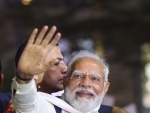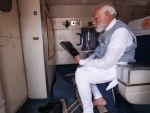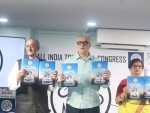India's participation in the Thirty Metre Telescope Project approved
"The TMT will be constructed at a cost of US$ 1.47 billion (in 2012 Base Year Dollars) by an international consortium consisting of institutions from the USA, Canada, Japan, India and China. From the Indian side, this will be a joint project of the Department of Science and Technology (DST) and the Department of Atomic Energy (DAE)," read a government statement.
With its contributions, India will be a 10 percent partner in the project and 70 percent of its contributions will be "in kind".
This will translate into 25 to 30 observing nights on the telescope for Indian scientists per year.
This will enable Indian scientists to access a state-of-the-art telescope to answer some of the most fundamental questions in modern science. Indian institutions and industry will acquire or gain access to sophisticated technologies of relevance to the country.
India will also become a founding member of an important international scientific project.
The TMT will enable scientists to study fainter objects far away from us in the Universe, which gives information about early stages of the evolution of the Universe.
It will also give finer details of not-so-far-away objects such as undiscovered planets and other objects in the Solar System and planets around other stars.
This partnership will also enhance India’s technological capabilities in high-technology areas such as primary mirror segment figuring and polishing, mirror support system and edge sensor assembly and testing, software for observatory controls, data analysis pipelines, adaptive optics techniques etc.
The TMT will be one of the largest optical-infrared telescopes to come up in the next decade.
Its 30 metre diameter primary mirror will consist of 492 segments of 1.44 metre diameter each.
These mirror segments will be cleverly positioned relative to each other through sophisticated sensors, actuators and control systems, so that the entire assembly behaves like single monolithic mirror.
Its performance will be further improved by employing "adaptive optics" techniques thereby achieving performance as if the telescope is located above the Earth`s atmosphere.
This will be a national project anchored in the Indian Institute of Astrophysics (IIA), Bangalore and led by IIA, Aryabhatta Research Institute of Observational Sciences (ARIES), Nainital and Inter-University Centre for Astronomy and Astrophysics (IUCAA), Pune.
It will leverage the best of science and technology from wherever available in the country - from R&D institutions, higher educational institutions and industry.
All interested scientists from the country will get time on the TMT for their scientific studies on competitive basis.
The implementation of the project will be overseen by a high-level Executive Council co-chaired by Secretary, Department of Science and Technology and Chairman, Atomic Energy Commission and Secretary, Department of Atomic Energy.
Support Our Journalism
We cannot do without you.. your contribution supports unbiased journalism
IBNS is not driven by any ism- not wokeism, not racism, not skewed secularism, not hyper right-wing or left liberal ideals, nor by any hardline religious beliefs or hyper nationalism. We want to serve you good old objective news, as they are. We do not judge or preach. We let people decide for themselves. We only try to present factual and well-sourced news.







